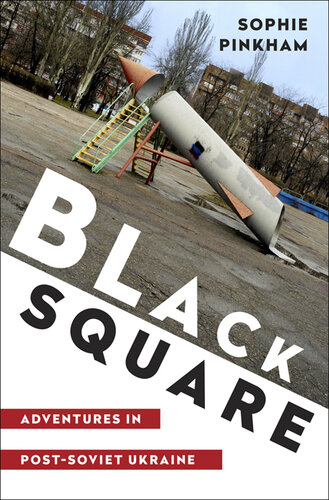
Black Square
Adventures in Post-Soviet Ukraine
کتاب های مرتبط
- اطلاعات
- نقد و بررسی
- دیدگاه کاربران
نقد و بررسی

October 3, 2016
Pinkham, who has written on Ukraine for the New Yorker, has a reporter’s incisive eye and gives a rich and fascinating view of post-Soviet Ukrainian life. She studied Russian and volunteered with health groups in college, and, after graduating in the early 2000s, was in search of purpose. She took a job with the Open Society Institute, working on an education and treatment program for drug users to combat the AIDS epidemic. Pinkham eventually moves to Ukraine—a country whose “horse-drawn carts and babushkas survived” alongside newfound wealth and a growing totalitarian state—and falls in love with it.
She’s astute in her observations as she takes a close look at Ukraine’s complex history and often hostile relationship with Russia. Pinkham is increasingly aware of the ever-present corruption and growing instability in Ukraine, and she examines the Maidan revolution and Putin’s annexation of Crimea in 2014, and the continuing war in eastern Ukraine. Pinkham’s look at Ukraine is accessible and comprehensive.

Starred review from October 1, 2016
A journalists first book, a graceful mix of personal memoir and political research, illuminates the complexities of Ukraine culture.The political upheavals of post-Soviet Ukraine can confound and confuse even Ukrainians, so its quite an achievement for Pinkham to untangle these strands with such style and insight. Whether through happenstance or fate, she found her idealism and longing for adventure paired with a beginners study of the Russian language and a fascination with the country and surrounding region. She served as a Red Cross volunteer in Siberia before graduate school and subsequently made a series of visits to Ukraine, working on an oral history project and helping with resources for HIV/AIDS, an epidemic in a country where hard drugs and shared needles were rampant. Pinkhams experiences with that countrys equivalents of punk rockers and communal hippies would be engaging enough on their own, but her account of how an initially nonviolent protest in the town square of Kiev turned deadly over a three-month span provides a perspective at odds with the black-and-white account one was more likely to read in Western mediaother than the articles she published in the likes of the New Yorker and the New York Times, which became the foundation of this book. Cold warriors lurched up out of their coffins, yelling about freedom, democracy, and the right side of history, she writes, while refusing to succumb to oversimplification about freedom-loving insurgents (who might also be homophobic, misogynist and anti-Semitic) or oppressive Russia (who may well have been conducting campaigns of false information). It was difficult to tell which of many sides were to blame when Molotov cocktails were flying from different directions, and nobody could figure out whose side the deadly snipers were killing for. Pinkham humanizes the people she met and befriended, and she recognizes that, if anything, a protest that led to warlike conditions has left the future even murkier than before. First-rate reporting, research, and writing in a debut that will make readers care as much as the author does.
COPYRIGHT(2016) Kirkus Reviews, ALL RIGHTS RESERVED.

September 1, 2016
Columbia University grad student Pinkham's title is part memoir and part thoughtful analysis of Ukraine's current crisis that curiously begins and ends in Russia. The author attempts to combine the two divergent sections at the start, but the book's heart covers the recent Maiden protests and tragic aftermath. The first section concentrates on Pinkham's accounts of harm reduction work as a Westerner traveling in Russia and Ukraine. While she's enamored with the country, she also begrudges its lack of Western ways and ideals. Once the focus turns to the recent uprisings and ensuing change of power, a more thorough investigation examines the faults, excesses, and accomplishments on both sides. Even then, the narrative remains centered on a specific subset of the population--artists, musicians, friends--and though not a wide cross section of society, their viewpoints are incredibly diverse and well depicted in both current and historical context. VERDICT The two sections will draw different readers. The first half will hold those interested in travel, NGOs (nongovernmental organizations), and a glimpse at their oft-ignored underbelly while the discussion of the Maiden protests will draw in everyone from casual readers to news junkies and beyond.--Zebulin Evelhoch, Central Washington Univ. Lib., Ellensburg, WA
Copyright 2016 Library Journal, LLC Used with permission.

October 1, 2016
Pinkham, whose writing on Russia and Ukraine has appeared in the New Yorker and the New York Times, here presents adventures indeed, depicting her travels and work throughout the region. Pinkham volunteered with health groups and studied Russian, which led her to work for the Red Cross in Siberia, searching for something she could not yet name. Her involvement with the Open Society Institute brought her in close contact with people who had grown up in the struggling post-Soviet countries, and here Pinkham tells their stories. She has a keen eye and a winsome ability to weave colorful visions from the smallest fragmentsorigami tulips, the beauty of fur-coated Siberian women, stones on the beach. As her public-health work led her from Siberia to Moscow, and Kiev, her musing on Kazimir Malevich's painting of a black square on a white background, signifying the end of time, the culmination of history, corresponds to the increasing tensions between Russia and Ukraine, the 201314 Maidan protests, and Crimea, a contested, cherished place. This engaging, clear-eyed portrait of an intensely troubled region could not be more timely.(Reprinted with permission of Booklist, copyright 2016, American Library Association.)

























دیدگاه کاربران